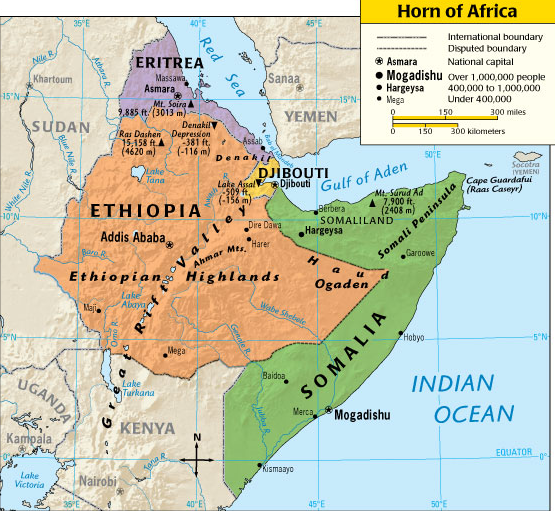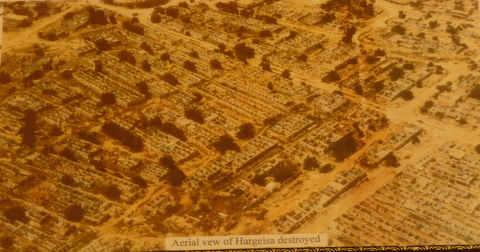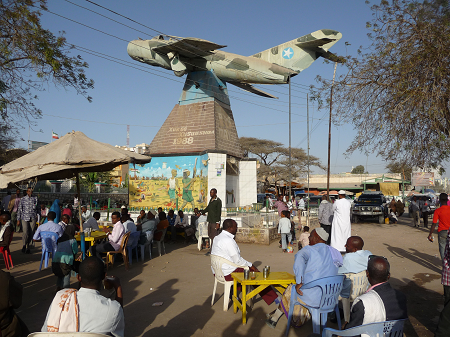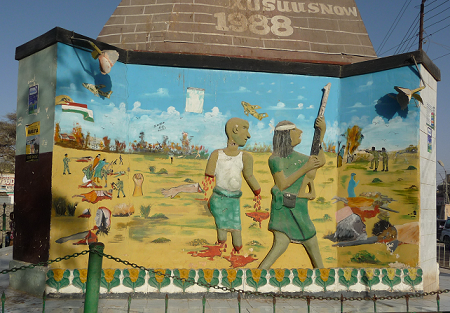THE WORLD’S MOST FREEDOM-LOVING PEOPLE
Hargeisa, Somaliland. Who are the most freedom-loving people in the world? Certainly not Americans.
Someday, Americans may find the courage to no longer sell their birthright of freedom for a mess of government entitlement pottage, as Esau sold his birthright to Jacob (Genesis 25:29-34). That’s someday, it sure isn’t now. Right now, the people who love freedom more than any other are a group of Moslems in the Horn of Africa.

They are the people of Somaliland, who would rather be impoverished and free than sell their freedom for pottage. Their story is a heroic saga, epically inspirational. Let me tell it to you.
In the 1880s, the Scramble for Africa by the European imperialist powers – France, Britain, Germany, Italy, Portugal, and Spain – was going full tilt. The Brits focused on the Horn in order to protect their colony of Aden (southern Yemen) and their supply route to India. The French did so to thwart the Brits, and the Italians to play the imperialist game with the big boys.
The French made a deal with the Sultan of Djibouti to create French Somaliland right at the entrance to the Red Sea. The Brits then made a deal with the Sultan of Berbera to establish a protectorate called British Somaliland. They were happy with the marvelous natural harbor of Berbera. The Italians had to settle for the coast no one wanted, from the tip of the Horn to British East Africa (Kenya), which they called Italian Somaliland.
After World War I, the Brits built roads and established towns like Hargeisa in the nomadic hinterlands beyond the coast. This continued after WWII, and by 1960, Britain granted independence to their protectorate as the State of Somaliland. It lasted five days.
The French had been smarter, and granted Djibouti independence in “association” with France. In keeping with British post-war colonial stupidity, the Brits screwed Somaliland like they did India(cf: The Lunacy of a British Legacy, July 2006).
The Brits conquered Italian Somaliland during WWII, then handed it over in 1949 to Italy’s post-fascist government administered as the Trust Territory of Somalia. When Italy granted it independence in 1960 five days after Somaliland, the Brits “persuaded” the latter to unify with the former into the merged Republic of Somalia with the capital at Mogadishu. Somalilanders have regretted their acquiescence ever since.
Then on top of that, the brainless Brits allowed the Soviets to establish a military relationship with Somalia instead of with them. By 1969, KGB agents had sufficiently indoctrinated a cadre of Somali officers led by their commanding general Siad Barre to organize a coup and install Barre as the head of the ruling Supreme Revolutionary Council.
Portraits of Marx, Lenin, and Barre appeared everywhere, and a total Communist dictatorship established. With massive Soviet aid, Barre quickly built a huge well-equipped army, and started talking about “Greater Somalia” which included large chunks of his neighbors’ territory populated by ethnic Somalis – in particular the Ogaden region of Ethiopia and northeastern Kenya.
In 1977, Barre invaded the Ogaden, routing the surprised Ethiopians and capturing it all. Big mistake. He forgot that the Soviets were also behind the new Marxist government of Mengistu Haile Mariam in Ethiopia, which was a vastly bigger prize for them than Somalia (just like we saw in The Black Norks of Eritrea, February 2011).
So the Soviets betrayed Barre just like they did Afewerki in Eritrea, and sent in 15,000 Cuban troops to kick Barre’s army out of the Ogaden. Outraged, Barre expelled the Soviets and declared he wanted to be friends with America. Jimmy Carter complied even though Barre remained a murderous dictator.
In 1981, shortly after Ronald Reagan became president, a Somali National Movement was formed in Somaliland and began guerrilla attacks on Barre government targets operating out of nearby Djibouti. The SNM declared it was fighting for a Western-style representative democracy with human rights and freedom of speech.
The SNM guerrillas were increasingly successful during the 1980s while Barre became increasingly more brutal, culminating in his 1988 aerial bombardment of Somaliland’s main city, Hargeisa, turning it into rubble and killing tens of thousands of people. Here is what the city looked like:

It was Barre’s last gasp. By the end of 1990, the SNM was in total control of Somaliland and Barre’s army in full retreat. When a collection of warlords captured Mogadishu and Somalia collapsed into anarchy in January 1991, the SNM declared Somaliland to be independent. Barre fled first to Kenya, then Nigeria where he died in 1995.
Thus for the last 22 years, Somaliland has been independent, free, and sovereign, with its own government, laws, courts, police, army, and a full panoply of governmental institutions. Yet not one single country or international organization will recognize its sovereignty, pretending instead it’s actually and legally part of Somalia – so it’s cut off from the global economy, from international banking, insurance, and trade.
Somaliland is the opposite of anarchic, pirate and terrorist-infested Somalia. It is peaceful and safe – as I can attest to having driven all around for the last few days.
Somalilanders despise the pirates and terrorists. Yes, they are Moslems, but as they are quick to tell you, “We are Sufis, not Salafis,” meaning they ascribe to the mystic and peaceful form of Islam (Sufism), not the fundamentalist form that wants a medieval Islam (Salafism) as practiced by the Wahhabis of Saudi Arabia, and Jihadi terrorists.
Somalilanders love to trade and do business. The government’s Minster of Commerce, Adan Elmi Ahmed, told me, “We have low taxes and only necessary regulation. We have a pro-business investment policy with dependable courts, enforceable contracts, and rule of law. We do not allow bribes. Most of all, we love competition. We like choices, variety, and cheap prices – with competition you get all three.”
A local businessman, Moustapha Osman Guelle, confirms this. A graduate of Oxford in England, he has acquired the Coca Cola bottling franchise for Somaliland, and has built a gleamingly modern Coca Cola bottling plant in Somaliland, producing 18,000 cases a day. Be sure and read Moustapha’s story in the link, as it’s so uplifting. “This is the most pro-free enterprise country in Africa,” he told me.
This is echoed by Guellah Osman Guella, owner of Beyomol Natural Gums in Hargeisa. Somaliland exports 330,000 pounds of the Biblical aromatics, frankincense and myrrh, mostly for the perfume industry in France. “Somaliland is fantastic for doing business because the government keeps out of the private sector,” he says. “Somaliland allows you to do your business and they don’t interfere.”
In addition to being Africa’s most free-enterprise country, Somaliland is also arguably the most democratic. Somaliland has had three free and fair elections. In the last (2010), then-president, Dahir Riyale Kahin, was defeated by the opposition party candidate, Ahmed Mahamoud Silanyo – whereupon Mr. Kahin stepped down and wished his successor well.
There are 54 member states of the Africa Union and you can count the real democracies among them on the fingers of one hand. But Somaliland is denied membership in the AU. Not a single African state will recognize it.
So – here we have a peaceful, stable, secure country carved out of the most failed state on the planet, a Sufi Moslem democracy that’s solidly pro-freedom and pro-capitalist, that wants to participate in the modern global economy and not retreat from it, that wants to be the ally of America and the West in one of the world’s most strategic places.
This is flat-out heroic. You’d think America would recognize Somaliland in a heartbeat, that the US military would already have a major naval base and air station at Berbera, that US business would be encouraged to invest. But no. For 22 years it’s been no. Why?
I’ve yet to hear a cogent answer. It can’t be the fear that recognition of Somaliland as a separate nation from Somalia would open the floodgates of African disintegration.
True, most African countries are make-believe colonial constructs. If one succeeds in breaking apart, the argument goes, dozens could follow with all political hell breaking loose. But that argument has fallen on its face, with two countries in the Horn having broken up already – Eritrea seceding from Ethiopia and South Sudan seceding from Sudan – and both admitted into the United Nations as sovereign member states.
The only answer I can see is frighteningly irrational. It’s the unpleasant truth that so often, in the famous quote attributed to Brooklyn Dodgers’ manager Leo Durocher in 1939, “Nice guys finish last.” The Somalia of Mogadishu, of Blackhawk Down, of pirates and terrorists, is catered to, fawned upon, placated at every turn, and extended diplomatic recognition by countries all over the world.
Peaceful, safe, pro-West Somaliland is a threat to no one, and it gets the back of everyone’s hand.
Despite this, despite all the enormous pressure on them by the world “diplomatic community” to surrender their sovereignty and submit to being ruled by Mogadishu, despite the poverty and isolation they must endure, Somalilanders remain determined to keep their freedom.
The symbol of this determination is a MiG fighter jet that the SNM was able to bring down during the 1988 bombardment. It rests on a plinth in the center of downtown Hargeisa:

Paintings on the base graphically depict the butchery of Siad Barre:

Note that the freedom fighter carrying the rifle is a woman. The men and women of Somaliland have built their country from scratch, literally from rubble all by themselves. Their fierce, uncompromising desire to be free should be an inspiration to us. If they can refuse to buckle under in circumstances of privation that would be an utter nightmare for most any American, then we have no excuse for buckling under to the Tyranny of Zero.
America’s heritage of freedom is the greatest of any nation, of any culture, of any people in the history of humanity. It is one of history’s most inglorious tragedies that this priceless heritage is dying before our eyes, dying not with a bang but a whimper, pawned away for alms and pottage.
We had better be inspired by the people of Somaliland. We had better be determined to shake of the shackles of government alms and become the world’s most freedom-loving people. We were once. We are no longer. Do we have it in us to be so again?

